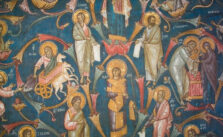Photo: monastery.ru
In the name of the Father, and of the Son, and of the Holy Spirit!
As we celebrate the forefeast of the Nativity of Christ today, the holy Church presents us with images of the righteous figures from the Old Testament who spent their lives anticipating the coming of Christ the Savior. They instilled this hope in their children and grandchildren, who upheld their faith until the very end. This compels us to join in their expectation so we can meet the upcoming grand feast not merely as a remembrance but as a profound experience—entering the cave and worshiping alongside the shepherds and the magi. Today, we are called not only to remember the Old Testament Fathers but also to draw inspiration from their virtues that are relevant in our times.
We sang: “Great are the achievements of faith; for the Three Holy Youths rejoiced in the fiery furnace as though resting by peaceful waters, and the Prophet Daniel appeared as a shepherd among lions like among sheep. By their prayers, O Christ God, save our souls” (Troparion of the Holy Fathers). The Church commemorates them now as they are temporally closer to the coming of Christ the Savior than the Forefathers celebrated a week ago. They vividly prefigure the coming of Christ, yet they are not alone; all of humanity from the Old Testament had numerous righteous men among them, even when they lived in darkness.
We no longer see through a glass darkly; He who was to come and suffer for the salvation of many has already appeared—our faith has transformed. If we are now told that we must practice patience, our primary example is the Lord Himself. The Apostle calls the faithful to steadfastness, pointing them towards the Author and Finisher of our faith; Who, for the joy that was set before Him, endured the Cross, despising the shame, and is now seated at the right hand of the throne of God. For consider Him that endured such contradiction of sinners against Himself, lest ye be wearied and faint in your minds (Heb. 12:2–3). He set an example for us, whereas the Old Testament believers had only one promise: “The Seed of the woman shall crush the head of the serpent” (cf. Gen. 3:15).
The Old Testament man was exiled from Paradise to Earth to be “raised up honorably” and to ascend back to the heavenly realm.
Adam waited for 900 years. He named his first son “Acquired.”1 He not only embodied this faith and patience but also entrusted it to those around him as he approached death. We know of Noah’s remarkable patience as he fulfilled the Lord’s command amid widespread derision. We also recognize Eber, who endured mockery for refusing to take part in the Tower of Babel’s construction, striving to deter those intent on undertaking this folly. Likewise, Job demonstrated profound patience amid suffering.
Why are we called to be patient? According to the Apostle Paul, patience is necessary for gaining experience. This principle is embodied in our daily work. If we learn something with steady patience, we will perform it well; the work of an impatient person yields little fruit. Patience fosters experience, which is why the Church, through the examples of these noble men, instructs us to resiliently hold onto our hope.
If patience holds such significance, what is it, and how can we cultivate it?
“Patience,” says St. John Climacus, “is submitting oneself to the expectation of daily sorrow” (Ladder of Divine Ascent 27:70).
This was the experience of Old Testament believers. The Lord informed them that they would earn their bread by the sweat of their brow. Was it not also said to us: In the world ye shall have tribulation (Jn. 16:33)?
In our age, when the faithful encounter scorn, insults, and humiliation while awaiting the Nativity of Christ and standing before the great Fathers of the Old Testament, we must understand that such is the nature of our existence. We should train ourselves in patience and be prepared to endure these challenges.
Who among us can be deemed patient?
“It is not merely when we bravely withstand the mockery of our own that we are considered patient, but rather when we endure from all kinds of people” (Ladder of Divine Ascent 4:84).
This was evident in the lives of all these figures. Moses demonstrated incredible patience when those he liberated from Egyptian bondage reproached him: “Why did you bring us out of Egypt?” David likewise showed patience when he refrained from retaliating against Shimei’s insults, instructing those who sought vengeance: What have I to do with you, sons of Zeruiah? Let him curse, for the LORD hath said unto him, Curse David. Who shall then say, Wherefore hast thou done so? (2 Kg./Sam. 16:10). Remaining patient in the face of such abuse is truly commendable.
“I once saw three monks,” St. John Climacus recounts, “who suffered the same injury at once. The first felt the sting of the offense and was troubled but remained silent; the second rejoiced at the injustice for the reward it would bring him, while feeling sorrow for the wrongdoer; the third wept fervently, focusing on the suffering of his erring neighbor” (Ladder of Divine Ascent 8:27).
We, who have not yet reached the level of the first brother who was offended yet chose silence, may find it hard to fathom the depth of the virtues demonstrated by the other two. However, we must strive to at least achieve that initial level, for in our silence, we are already halfway to humility. The second brother, who took joy in his suffering while lamenting for his accuser, had yet to reach the place of praying for his adversary. The third, however, mirrored the Lord Himself, who forgave His persecutors from the Cross, praying, Father, forgive them; for they know not what they do (Lk. 23:34).
In our present day, where true teaching is derided, and it is nearly deemed obligatory to insult and belittle the servants of Christ, every believer is often viewed as a “darkener of the national consciousness, harboring foolish beliefs.” Standing now at the doorstep of this magnificent feast, we must greet Christ the Savior with patience, as mandated by the Church. Today, we reflect on the images of the righteous from the Old Testament, who possessed only one testimony handed down through the ages. After the arrival and sacrifice of Christ, the Author and Finisher of our faith, do we not likewise require the same labor of patience as our forebearers? They, like our ancestors, bear responsibility for us, offering us examples of faith and patience that we should pursue.
We ought not to lament our offenses. After all, they too offended Christ the Savior Himself. We should grieve for those who could be members of the holy Church yet remain in darkness; we must pray for them and shed sincere tears. Our call to patience is easier today than it was in the Old Testament; we possess both faith and a desire to proclaim it, though often lack patience. Yet, the righteous from the Old Testament demonstrate to us what patience looks like. If the forthcoming feast brings joy to many, let us remember the Old Testament Fathers, who walked the path of patience and garnered faith and spiritual insight down that road.
As we await the birth of our Lord, let us rejoice even amidst the great trials He may send. Today, as we honor the righteous of the Old Testament, let us remember that our Redeemer is being born, opening to us the doors of Paradise.
Amen.

